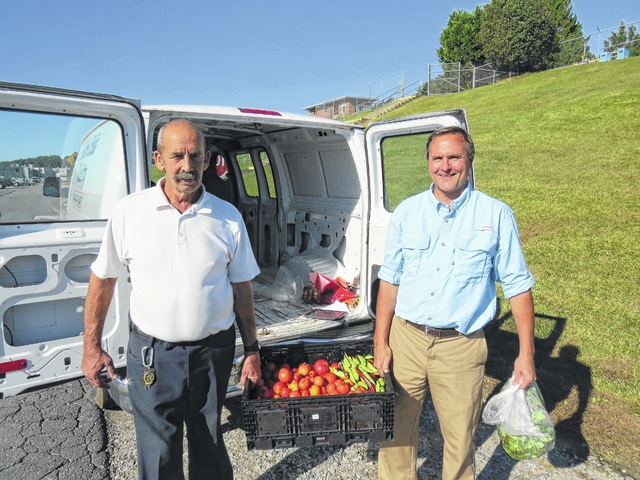POLKTON — Inmates at an Anson County prison have donated nearly 1,000 pounds of produce to help feed the needy this year.
Students taking a horticulture class at Brown Creek Correctional Institution have grown a variety of produce since earlier this spring. The class is offered through South Piedmont Community College and is taught by Polkton farmer Gary Sikes, who owns Bountiful Harvest Farm.
Each week, a volunteer from Anson Crisis Ministry pulls up to the entrance of the medium custody section of the prison in a van, and Sikes gives them boxes and bags filled with freshly harvested produce.
The class harvested sweet corn in mid-June, and has since harvested tomatoes, peppers, cucumbers, watermelon, cantaloupes, squash, string beans, chives, potatoes, cilantro and okra, with the tomatoes doing particularly well, according to Sikes. The students are currently preparing to harvest cabbage, collards, beets, mustard greens, turnip greens, kale and broccoli.
Ann James, director of the ministry, said that the garden benefits both her clients and Sikes’ students.
“It’s a good thing for the inmates to have something to do to give back to the community,” she said. “Gary told me it’s very rewarding to them to know the produce they’re growing is going to a nonprofit agency to benefit the needy people of Anson County. We’ve enjoyed it, and we tell clients it’s fresh produce from Anson County.”
As of Oct. 28, the class had donated 878 pounds, according to James, with 208 pounds donated in June alone.
“It’s been helpful to us and the inmates, just everybody,” James said. “There was no negative to it. It was all positive.”
Although James said she does get a good deal of produce from Walmart, IGA and Food Lion and that it helps, she said she also enjoys giving produce that is grown locally.
“If we had to buy produce, we’d probably get much, much less than what we do now,” she said.
Kory Dalrymple, assistant superintendent for programs at Brown Creek, agreed that the class helps the students.
“A lot of the inmates around here feel as though they’d like to give back to the community because a lot have matured enough to know they did some stuff they’re not proud of,” he said. “And now want to do some stuff they are proud of and are trying to grow some stuff and put it back in for the needy.”
Dalrymple said that the class has been very educational, with the students learning a lot.
“There’s been several who have expressed how much they’ve learned in the class by growing the produce and everything else,” he said. “They have two greenhouses, so it goes from seeds to seedlings and planting it in the actual ground so it’s producing vegetables and whatever. So they learn a lot that way.”
In addition to the produce donated to the ministry, Sikes said that the class has sold plants.
“Along with the garden, the class started with over 20,000 plants consisting of flowers and vegetable plants in the greenhouse over the year,” Sikes wrote in a release. “Plants were sold or used to beautify the grounds and a nursery is in the plans for the coming season.”
Class structure
Sikes said the students do much more than puttering around in a greenhouse. Everything grown in the class is organic, so the students have to do everything without chemical fertilizers and pesticides. They learn about irrigation, plant nurseries, landscaping, maintenance and more.
In addition to maintaining the gardens, they work on the business aspect.
“They will have to do business plan for a business in a horticultural field,” Sikes said. “That can be for vegetable production, a maintenance company, nursery production, whatever they choose to do their proposed project in. We will be talking about business and putting together a business plan in the next class.”
Sikes said his students have enjoyed the class.
“It’s been really good for them,” he said. “It helps their time go by a lot faster.”
He said the students enjoy the work.
“They enjoy getting outside and doing things with their hands and doing something constructive,” Sikes added.
The class planted its peas late and lost them due to frost, but have moved on to the next project.
“We were late getting the peas in, so they didn’t get to harvest them, but it’s no big deal,” Sikes said. “All of our summer garden now is in cover crops and doing pollinator plants where the peas failed.”
New students join the class every two months. The first class will graduate from the year-long program in December. Students receive a certificate every two months and will get a final certification that tallies their hours when they graduate.
Armed with their new knowledge and certifications, Sikes thinks his students will be well-equipped when they are released from prison.
“The hope is that this will give them enough experience that they could possibly find employment,” he said. “Or if they don’t or find it in another area, can go on through and maintain landscapes and know how to do it well.”
Sikes collected written comments from students in his class for an evaluation. All of them praised both Sikes and the class itself.
One student wrote that the class has helped him meet his gardening goals. Some wrote that they enjoy the spiritual benefits and giving back to the community, especially by feeding the needy.
Unsure about his job prospects once he is released, one student wrote that he was glad to have his new skills to fall back on. Still another student said that he has a hard time with some subjects but has enjoyed learning horticulture.
One student loved the class so much that he said he wants to take it again.

